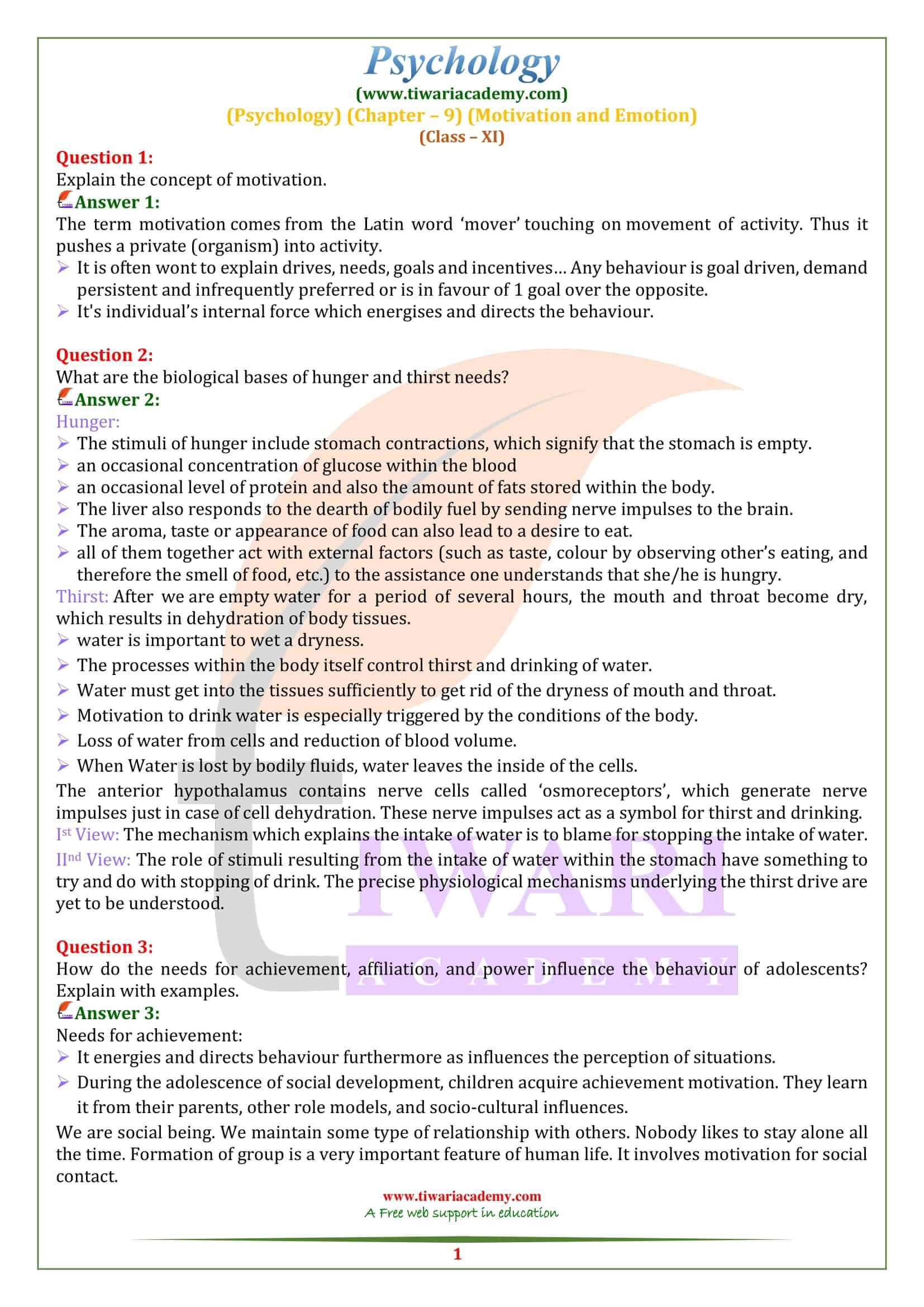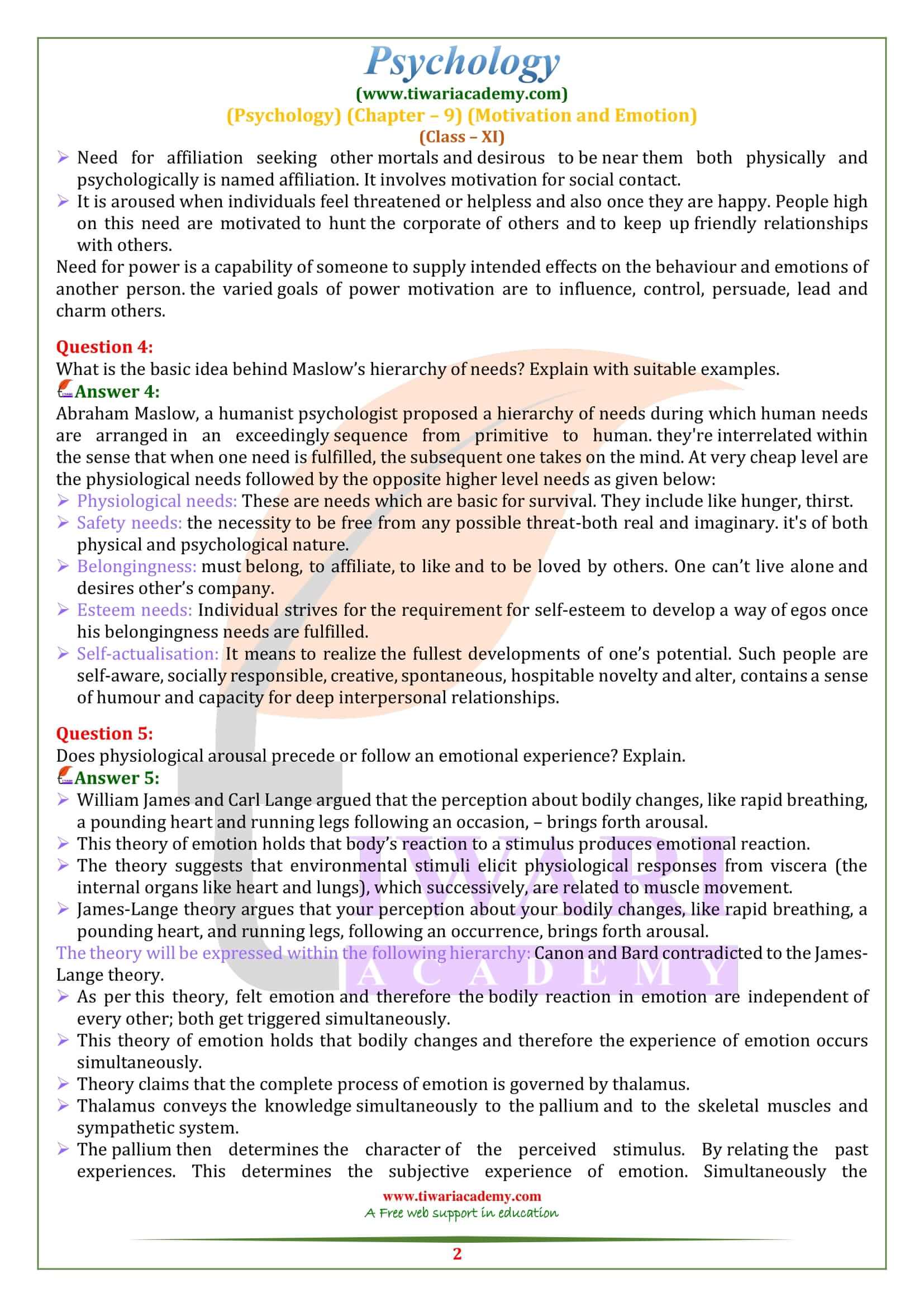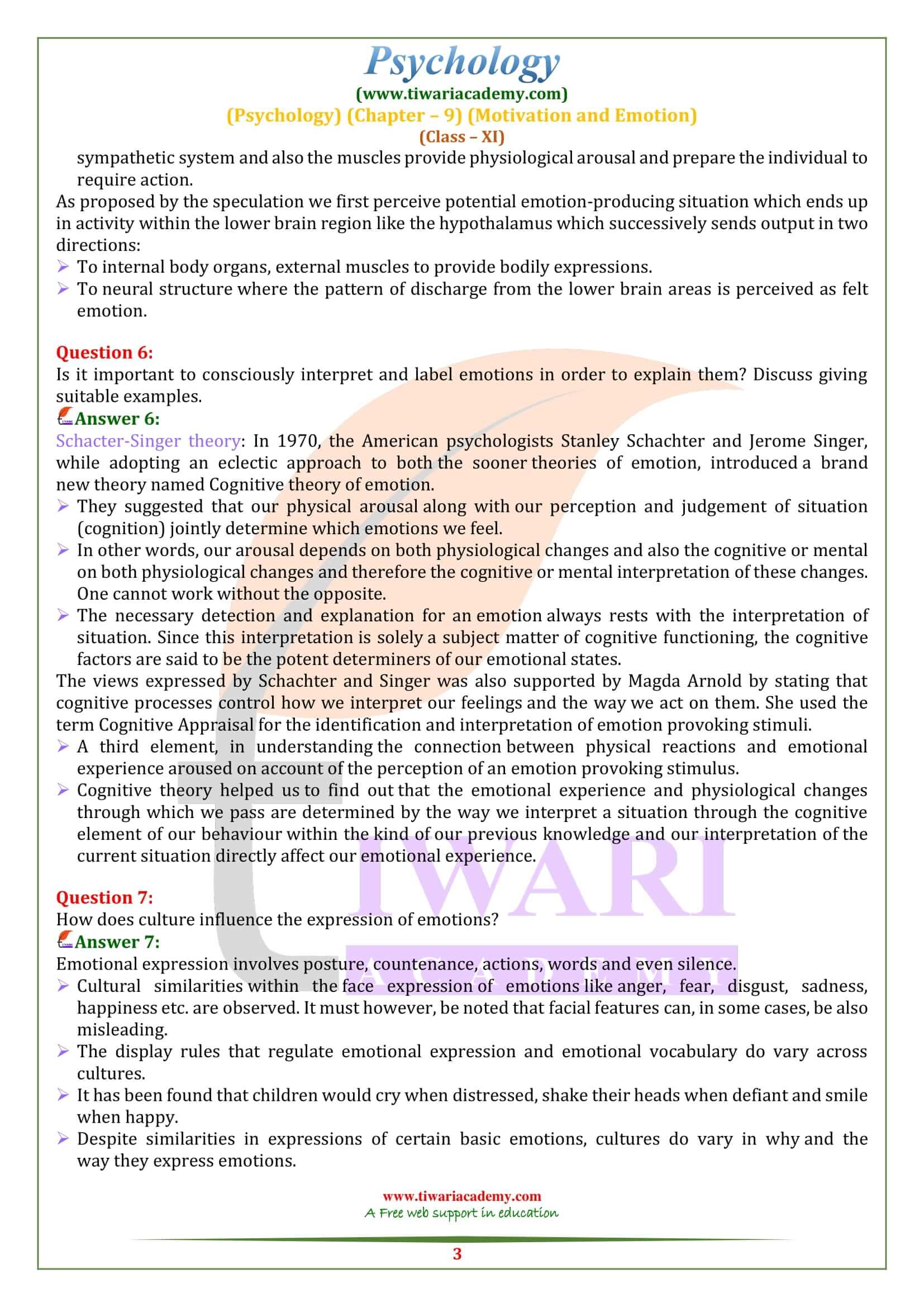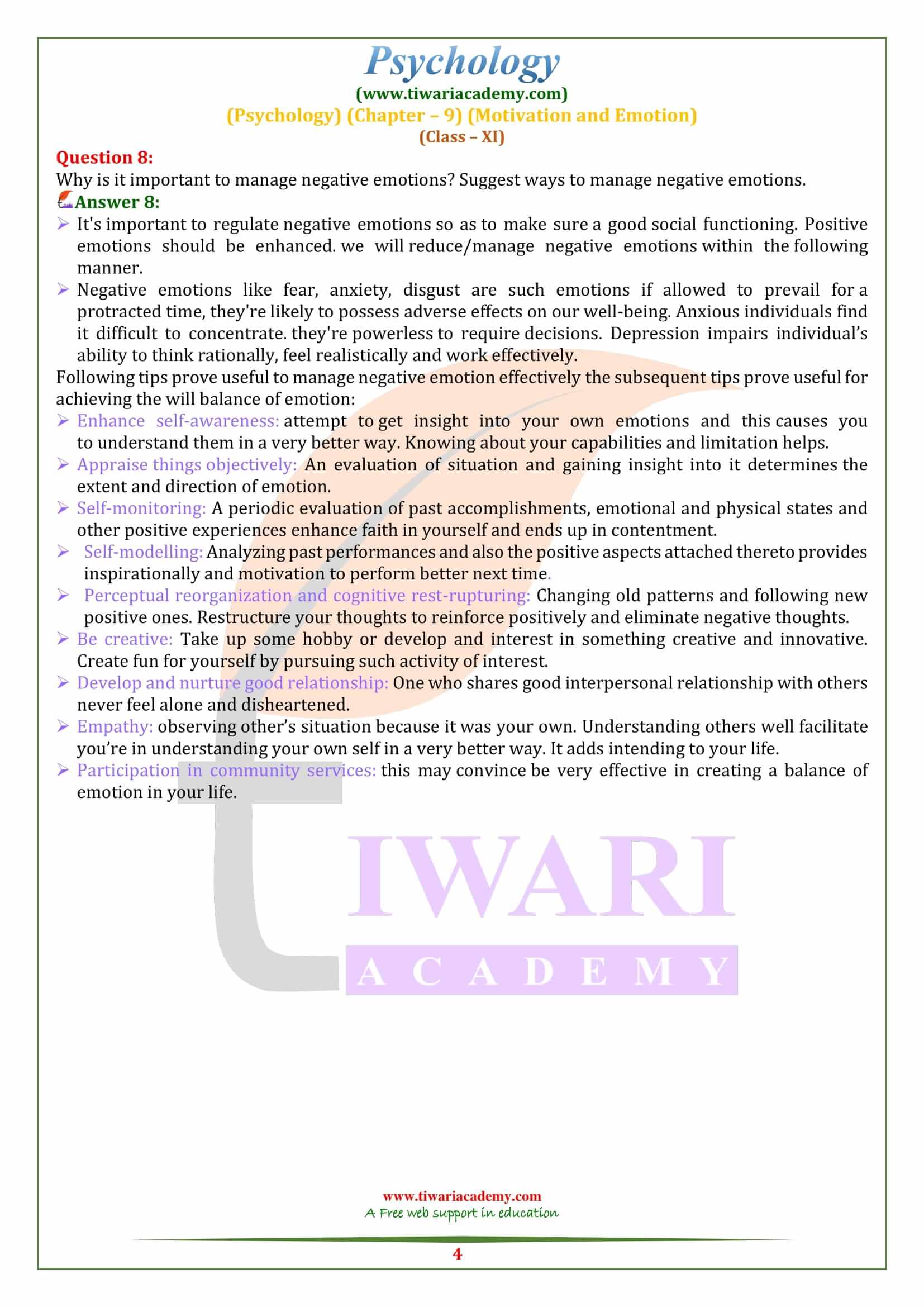NCERT Solutions for Class 11 Psychology Chapter 9 Motivation and Emotion in English Medium updated for new academic session 2024-25. Get here class 11 Psychology chapter 9 important questions and MCQ for the preparation of exams.
NCERT Solutions for Class 11 Psychology Chapter 9
Class 11 Psychology Chapter 9 Motivation and Emotion Question Answers
Explain the concept of motivation.
The term motivation comes from the Latin word ‘mover’ touching on movement of activity. Thus it pushes a private (organism) into activity.
- It is often wont to explain drives, needs, goals and incentives… Any behaviour is goal driven, demand persistent and infrequently preferred or is in favour of 1 goal over the opposite.
- It’s individuals internal force which energises and directs the behaviour.
How do the needs for achievement, affiliation, and power influence the behaviour of adolescents? Explain with examples.
Needs for achievement:
It energies and directs behaviour furthermore as influences the perception of situations.
During the adolescence of social development, children acquire achievement motivation. They learn it from their parents, other role models, and socio-cultural influences.
We are social being. We maintain some type of relationship with others. Nobody likes to stay alone all the time. Formation of group is a very important feature of human life. It involves motivation for social contact.
Need for affiliation seeking other mortals and desirous to be near them both physically and psychologically is named affiliation. It involves motivation for social contact.
It is aroused when individuals feel threatened or helpless and also once they are happy. People high on this need are motivated to hunt the corporate of others and to keep up friendly relationships with others.
Need for power is a capability of someone to supply intended effects on the behaviour and emotions of another person. the varied goals of power motivation are to influence, control, persuade, lead and charm others.
What is the basic idea behind Maslow’s hierarchy of needs? Explain with suitable examples.
Abraham Maslow, a humanist psychologist proposed a hierarchy of needs during which human needs are arranged in an exceedingly sequence from primitive to human. they’re interrelated within the sense that when one need is fulfilled, the subsequent one takes on the mind. At very cheap level are the physiological needs followed by the opposite higher level needs as given below:
Physiological needs: These are needs which are basic for survival. They include like hunger, thirst.
Safety needs: the necessity to be free from any possible threat-both real and imaginary. it’s of both physical and psychological nature.
Belongingness: must belong, to affiliate, to like and to be loved by others. One can’t live alone and desires other’s company.
Esteem needs: Individual strives for the requirement for self-esteem to develop a way of egos once his belongingness needs are fulfilled.
Self-actualisation: It means to realize the fullest developments of one’s potential. Such people are self-aware, socially responsible, creative, spontaneous, hospitable novelty and alter, contains a sense of humour and capacity for deep interpersonal relationships.
Does physiological arousal precede or follow an emotional experience? Explain.
William James and Carl Lange argued that the perception about bodily changes, like rapid breathing, a pounding heart and running legs following an occasion, – brings forth arousal.
This theory of emotion holds that body’s reaction to a stimulus produces emotional reaction.
The theory suggests that environmental stimuli elicit physiological responses from viscera (the internal organs like heart and lungs), which successively, are related to muscle movement.
James-Lange theory argues that your perception about your bodily changes, like rapid breathing, a pounding heart, and running legs, following an occurrence, brings forth arousal.
The theory will be expressed within the following hierarchy: Canon and Bard contradicted to the James-Lange theory.
As per this theory, felt emotion and therefore the bodily reaction in emotion are independent of every other; both get triggered simultaneously.
This theory of emotion holds that bodily changes and therefore the experience of emotion occurs simultaneously.
Theory claims that the complete process of emotion is governed by thalamus.
Thalamus conveys the knowledge simultaneously to the pallium and to the skeletal muscles and sympathetic system.
The pallium then determines the character of the perceived stimulus. By relating the past experiences. This determines the subjective experience of emotion. Simultaneously the sympathetic system and also the muscles provide physiological arousal and prepare the individual to require action.
As proposed by the speculation we first perceive potential emotion-producing situation which ends up in activity within the lower brain region like the hypothalamus which successively sends output in two directions:
- a. To internal body organs, external muscles to provide bodily expressions
- b. To neural structure where the pattern of discharge from the lower brain areas is perceived as felt emotion.
Why is it important to manage negative emotions? Suggest ways to manage negative emotions.
It’s important to regulate negative emotions so as to make sure a good social functioning. Positive emotions should be enhanced. we will reduce/manage negative emotions within the following manner.
Negative emotions like fear, anxiety, disgust are such emotions if allowed to prevail for a protracted time, they’re likely to possess adverse effects on our well-being. Anxious individuals find it difficult to concentrate. they’re powerless to require decisions. Depression impairs individual’s ability to think rationally, feel realistically and work effectively.
Following tips prove useful to manage negative emotion effectively the subsequent tips prove useful for achieving the will balance of emotion:
Enhance self-awareness: attempt to get insight into your own emotions and this causes you to understand them in a very better way. Knowing about your capabilities and limitation helps.
Appraise things objectively: An evaluation of situation and gaining insight into it determines the extent and direction of emotion.
Self-monitoring: A periodic evaluation of past accomplishments, emotional and physical states and other positive experiences enhance faith in yourself and ends up in contentment.
Self-modelling: Analyzing past performances and also the positive aspects attached thereto provides inspirationally and motivation to perform better next time.
Perceptual reorganization and cognitive rest-rupturing: Changing old patterns and following new positive ones. Restructure your thoughts to reinforce positively and eliminate negative thoughts.
Empathy: observing other’s situation because it was your own. Understanding others well facilitate you’re in understanding your own self in a very better way. It adds intending to your life.
Participation in community services: this may convince be very effective in creating a balance of emotion in your life.








